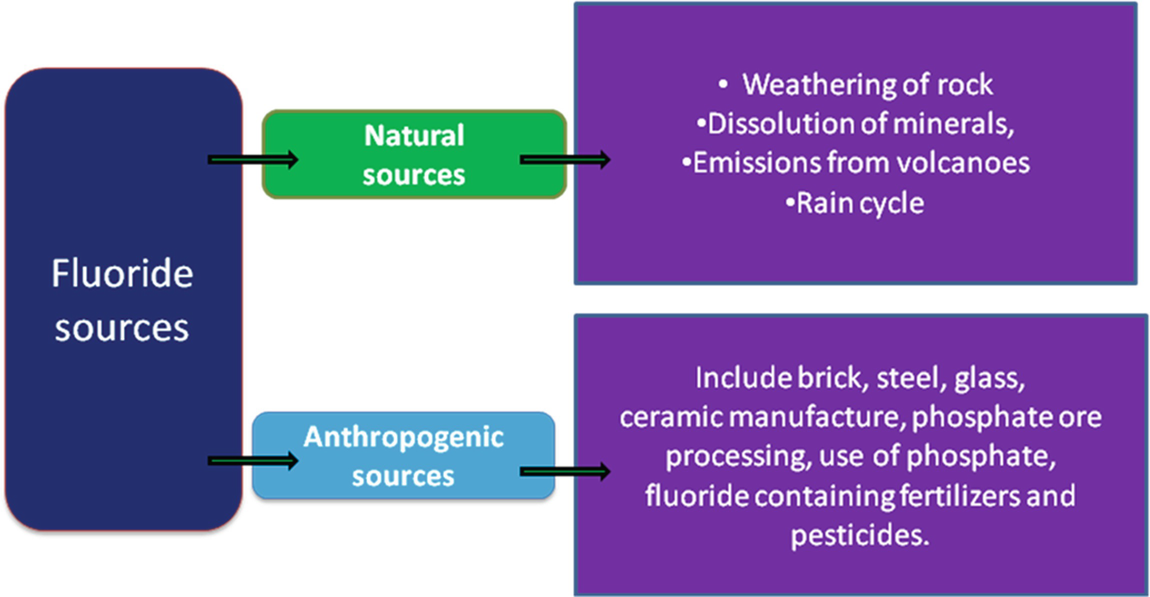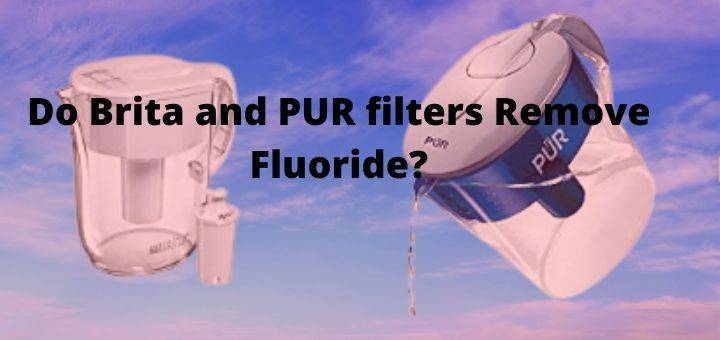Fluoride is a naturally occurring mineral that is commonly added to public drinking water supplies to help prevent tooth decay.
While fluoride has been shown to be effective at improving dental health, some people are concerned about the potential negative effects of consuming too much fluoride.
If you are one of these people, you may be wondering whether a water filter, such as a Brita or PUR filter, can remove fluoride from your drinking water.
The answer is that it depends on the specific filter you are using. In general, most Brita and PUR filters are not designed to remove fluoride from drinking water.
However, there are some exceptions, and it is possible to find Brita and PUR filters that are specifically designed to reduce the amount of fluoride in water.
Do Brita and PUR filters Remove Fluoride?
No, because Brita and Pur are designed to remove various sizes of dirt and pollutants. The lightest filth can be removed from your shower with soap and water, but what about the hard-to-reach sludge and debris? Clarifiers, cleansers, and polishers are some of the goods that can be utilized for this. Each is made to remove different sizes of silt and pollutants.
Filtration Methods That Will Remove Fluoride
Filters are an excellent technique to ensure that your water is safe to consume. Filters are typically installed in your faucet, but some can also be found in your refrigerator or under your sink. Filters can make your tap water safe to drink by removing chlorine, germs, and other impurities.
Filters work by using activated carbon (also known as activated charcoal) to remove these contaminants. If you’re wondering if Brita filters or PUR filters remove fluoride, the answer is yes.
Filters do remove fluoride in tap water, but they don’t remove all fluoride. There are some fluoride sources that you can’t remove with a filter, such as drinking water from wells or lake water.
Do we think ZeroWater filters remove fluoride?
Yes, it is likely that ZeroWater filters are able to remove fluoride from drinking water. ZeroWater uses a multi-stage filtration process that includes a blend of activated carbon and a proprietary “ion exchange media” to remove contaminants from water.
According to ZeroWater’s website, their filters are able to reduce up to 99% of total dissolved solids (TDS) from water, including fluoride.
In addition, ZeroWater filters are NSF certified to remove a wide range of contaminants, including fluoride, from drinking water. The NSF (National Sanitation Foundation) is an independent organization that tests and certifies products to ensure they meet strict safety and performance standards.
another post:
Best Water Filter Pitcher According To Reddit
We all know that tap water is perfectly safe to drink (no fluoride). The zero-fluoride water filter is a recent development. It can be a game-changer for people who live in places where fluoride contamination is a problem. All fluoride and other contaminants in tap water may be removed with this gadget.
Trace elements are minerals that occur naturally in tap water. This indicates they’re minuscule and only exist in trace levels. Other things, such as food and products, include trace elements. They’re also in the water supply.
Fluoride cannot be removed by the most common water filters, affordable activated-carbon pitchers, and tap attachments sold under the brands Brita and Pur. The pitcher appears to be of excellent quality and devoid of BPA.
ZeroWater is unaffected by hard water minerals, fluoride, iron, or even hydrogen sulfide. Carbon filters can’t remove contaminants like fluoride, arsenic, nitrates, and perchlorate, but reverse osmosis (RO) can.

Does ZeroWater remove fluoride, lead, and arsenic?
Depending on the technology employed, point-of-use filters like the Brita can reduce HAA5 in water (for example, those with activated carbon filters). Fluoride water filters are available in various sizes from Pure Water Freedom. It comes in various sizes and includes an activated carbon filter and a basket for keeping the water.
No, Brita filters do not remove fluoride, which is very small and complex to remove ions. I’m sure you can get rid of it with a decent ion exchanger. Brita claimed to have just released a new filter specifically certified to eliminate lead, but we weren’t utilizing it.
With Brita and PUR, ZeroWater is one of the top pitcher filters. Carbon filters eliminate chlorine from water by utilizing an activated carbon process.
To get filtered water, you’ll need a water filtration pitcher. No “wearing out” will occur. PUR and Brita filter pitchers, which are among the most popular water filters, will not remove fluoride from your water.
Another excellent water filter that simultaneously serves as an alkalizer is: Fluoride Water Filters & Filtration Methods to Remove Fluoride from Drinking Water. There are various advantages to installing a fluoride water filter.
According to studies, used Brita filters contain significantly more bacteria than the tap water they filter.
Brita filters work wonders when it comes to enhancing the flavor and odor of tap water. The popular Brita filter is one of the various types of water filters available. After that, toss it out with the rest of your trash.
Does the PUR water filter remove chloramine?
You have the option of buying a Brita or PUR filter. Brita water filters remove these two pollutants. Although a PUR water filter will not remove chloramine, it will help to lower fluoride levels in your drinking water.
Fluoride in water is a problem, as we all know. According to University of York researcher Christopher Ramsden, one-tenth of a gram of fluoride can be consumed through drinking water.
Water is filtered with activated carbon as soon as it reaches our homes. As a result, a PUR faucet-mounted filter will filter out chlorine, pharmaceuticals and chemicals, heavy metals like lead and mercury, and other organic compounds that can give water an unpleasant taste and odor.
Simply so, filter remove chloramine?
Yes, some water filters are able to remove chloramine from drinking water. Chloramine is a chemical compound formed by combining chlorine and ammonia, and it is often used as a disinfectant in water treatment plants.
Activated carbon filters are effective at removing chloramine from drinking water. These filters work by using a porous, highly adsorbent material to attract and trap contaminants, including chloramine.
Reverse osmosis filters can also remove chloramine, as they use a semi-permeable membrane to remove contaminants by forcing water through the membrane under pressure.
It is important to note that not all water filters are effective at removing chloramine. It is recommended to check the specifications of a filter and ensure that it is specifically designed to remove chloramine before purchasing. Regularly replacing the filter according to the manufacturer’s recommendations can also help ensure optimal performance.
- Are Brita filters capable of removing chloramine?
Yes, some Brita filters are able to remove chloramine from drinking water. Brita uses a combination of activated carbon and ion exchange resin in their filters to remove contaminants, including chloramine.
According to Brita’s website, their “Longlast” filter is able to reduce up to 99% of chloramine from tap water, as well as 99% of chlorine. However, their standard “Classic” and “Standard” filters are only able to remove around 25% and 50% of chloramine, respectively.
Other pollutants, such as chloramine, should also be removed from the water supply. Chloramine isn’t something you get from your tap. Water treatment plants and service providers, such as water utilities and private drinking water providers, create it.
How Does Brita Water Filter Remove Calcium?
Brita water filters use a medium called “ion exchange resin” to remove calcium from drinking water. Ion exchange resin is a porous, synthetic material that is able to attract and bind to positively charged ions, such as calcium. When water passes through the filter, the calcium ions are attracted to the resin and replaced with other ions, such as sodium.
Brita filters also use activated carbon to remove contaminants from drinking water. Activated carbon is a porous, highly adsorbent material that is able to trap contaminants, including calcium, as water passes through the filter.
Techniques for Filtering Water:
There are several techniques that can be used to filter water, including the following:
- Physical filtration:
This technique involves using a physical barrier, such as a cloth or filter paper, to remove contaminants from water.
- Activated carbon filtration:
Activated carbon filters use a porous, highly adsorbent material to remove contaminants, including chlorine, pesticides, and heavy metals. These filters are commonly used in home water filtration systems.
- Reverse osmosis:
Reverse osmosis involves using a semi-permeable membrane to remove contaminants from water by forcing it through the membrane under pressure. This technique is effective in removing a wide range of contaminants, including bacteria, viruses, and heavy metals.
Ultraviolet light:
Ultraviolet light can be used to kill bacteria and viruses in water, making it safe to drink. This technique is commonly used in water treatment plants.
- Boiling:
Boiling water for a certain amount of time can kill most bacteria and viruses, making it safe to drink. However, boiling does not remove other contaminants, such as heavy metals or chemicals.
- Distillation:
Distillation involves boiling water and then collecting the steam, which is then cooled and condensed back into liquid form. This process removes most contaminants from the water, but it can be time-consuming and requires a significant amount of energy.
Do shower filters remove chloramine?
Yes, some shower filters are able to remove chloramine from water. Chloramine is a chemical compound formed by combining chlorine and ammonia, and it is often used as a disinfectant in water treatment plants. It can be harmful to inhale or absorb through the skin, as it can irritate the respiratory system and cause dry, itchy skin.
Shower filters that include vitamin C are very good at eliminating chlorine and chloramines from shower water. KDF filters perform similarly poorly in hot water and do not remove chloramines. In contrast, vitamin C filters may be effective at removing chloramines from water.
Vitamin C is used as a filtering media in several showerhead filters to eliminate contaminants. In fact, it works. Obviously, not in every situation. When you use a Vitamin C filter to cleanse water that is high in chlorine, very few drops of it will come out of your shower head.
What types of toxins can ZeroWater remove?
Fluoride:
is a naturally occurring substance found on the earth? It’s a byproduct of the chemical reaction used to make sodium fluoride, which is used for water treatment. Fluoride helps to prevent the decay of teeth, and prevent tooth decay.
ZeroWater:
Has been proven that fluoride can be removed. The filter has been certified by the EPA to remove fluoride; sadly, I was unable to locate the certificate; however, multiple customers have confirmed that the pitcher does not contain fluoride.
Arsenic:
is a naturally occurring element that’s found in the Earth’s crust. It’s most often found in gold, copper, aluminum, and iron ores. Arsenic is toxic to humans and can be deadly if ingested or inhaled through the skin. You can find arsenic in many food products as well as in pesticides and insecticides.
ZeroWater is efficient at removing the following contaminants
Chlorine and Chloramine
Mercury
Dust & Rust
Chromium
Pesticides
Heavy Metals
CONCLUSION
Both Brita and PUR filters are able to remove some fluoride from drinking water. However, the effectiveness of these filters varies depending on the specific model and filter type used.
Brita filters typically use a combination of activated carbon and a medium called “ion exchange resin” to remove contaminants, including fluoride. According to Brita’s website, their “Longlast” filter is able to remove up to 99% of fluoride from tap water. However, their standard “Classic” and “Standard” filters are only able to remove around 25% and 50% of fluoride, respectively.
PUR filters use a similar combination of activated carbon and ion exchange resin to remove contaminants, including fluoride. However, the effectiveness of PUR filters in removing fluoride is not clearly stated on their website.
RECOMMENDATION:
If you are concerned about fluoride in your drinking water and want a reliable filter that can remove it, it is recommended to use a filter with a high percentage of fluoride removal, such as Brita’s “Longlast” filter. It is also important to regularly replace the filter according to the manufacturer’s recommendations to ensure optimal performance. It is recommended to do your own research and compare different filter options to find the one that best meets your needs and preferences.
- 25 Easy Crafts to Make and Sell Fast for Profit at Home - June 21, 2025
- 16 Essential Fall Maintenance Tasks to Prep Your Home for Winter - June 17, 2025
- Summer Home Prep: What to Fix and Clean Before the Heat Hits - June 14, 2025

